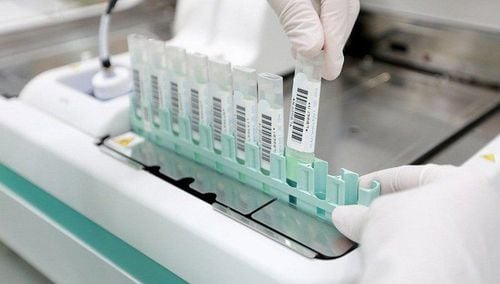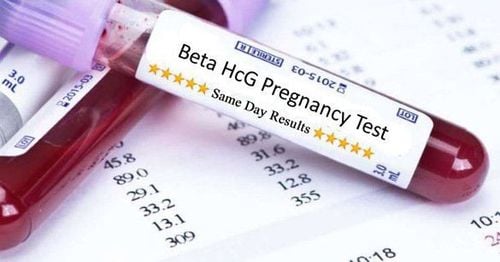This is an automatically translated article.
Autism spectrum disorder is a disease that severely affects a person's social skills, behavior, and ability to communicate. It usually appears when the child is under 2 years old and causes major obstacles to the child's development. Therefore, screening for autism spectrum disorder plays a very important role in the treatment of this disease. When autism is detected and treated early, children can reach their full potential.1. Importance of Screening for Autism Spectrum Disorder (ASD)
Autism spectrum disorder (ASD) is a brain disorder that affects a person's behaviour, social skills, and communication. Autism spectrum disorder typically presents primarily during the first 2 years of a child's life and includes a range of symptoms that range from mild to severe.Some children with ASD cannot even function on their own without support from a parent or caregiver. There are also some children who need less help from others and still live independently.
Sometimes ASD is discovered when a child is less than 18 months old. However, there are also some children with autism spectrum disorder who do not receive an early diagnosis until adolescence or adulthood. Early signs of autism spectrum disorder (ASD) often include:
Avoidance of eye contact Low concern for others, including peers or caregivers Limited ability language skills, such as difficulty using words or difficulty communicating Feelings difficult to adjust or upset by small changes in daily routine. As children with autism spectrum disorder become adolescents or adults, they may have difficulty developing and maintaining relationships with peers or others.
In addition, children can also receive care from health care professionals when other conditions occur such as obsessive-compulsive disorder, attention-deficit/hyperactivity disorder, anxiety, disorder behavior or depression.
Screening for autism spectrum disorder is the first step towards diagnosis. Although there is no cure for ASD, early diagnosis and treatment can help relieve autism symptoms and improve quality of life. In general, monitoring and screening for autism in children as early as possible will help them receive the best support to reach their full potential.
2. What causes autism spectrum disorder (ASD)?
Currently, there is no single cause of autism spectrum disorder (ASD). Many studies show that ASD is caused by a combination of factors, such as: Infections, genetic disorders, drug use during pregnancy, or older birth in both parents. and mother (35 years or older in women and 40 years or older in men).Some studies also indicate that there is no link between childhood vaccinations and autism spectrum disorders. If you're wondering about the risk factors and causes for ASD, talk to your doctor in more detail.

Rối loạn phổ tự kỷ ảnh hưởng nghiêm trọng đến kỹ năng xã hội
3. When should children be screened for autism spectrum disorder?
Autism spectrum disorder (ASD) can sometimes be detected when a child is 18 months old or older, health care professionals say. The American Academy of Pediatrics (AAP) recommends that all children be screened for autism and other developmental delays or disabilities at 9 months, 18 months, and 30 months of age.Additional screening may be needed if the baby is at high risk for developmental problems due to low birth weight or premature birth. In addition, children should also be specifically screened for autism spectrum disorder (ASD) during routine wellness visits at 18 or 24 months of age. Additional screening should be done when a child is at high risk for ASD, such as having a sibling with an autism spectrum disorder, or when the child has symptoms of the disease.
Generally, experts recommend that all children be screened for autism at 18 and 24 months of age. However, some children should be screened for autism spectrum disorder at an earlier age if they have the following symptoms of ASD:
Does not make eye contact when talking to others Does not respond to gestures or smiles laughter from loved ones Slow to speak or repeat words without understanding their meanings Repetitive body movements such as spinning or clapping Has an obsession with a particular object or toy Feeling Difficulty changing habits. In addition, older children and adults may also need screening for autism spectrum disorder when symptoms of ASD are present and undiagnosed as children, including:
Trouble communicating Feeling overwhelmed overwhelmed in social situations Extremely interested in a particular subject Repetitive body movements or actions.
4. How is the ASD screening process done?
There is currently no specific test for autism spectrum disorder (ASD). In general, screening for autism usually includes:A parent questionnaire to collect information about a child's development and behavior. Observe how your child plays and interacts with others Give your child a number of tests to test his thinking skills and decision-making abilities. Sometimes a physical problem can cause the same symptoms as autism spectrum disorder. Therefore, autism screening for children may also include:
Blood tests: Helps check for lead poisoning and certain other disorders Hearing tests: A hearing condition that can lead to problems social communication and language problems in children Genetic tests: Helps look for genetic disorders such as Fragile X syndrome. This syndrome can cause intellectual disabilities and symptoms like autism spectrum disorder. Fragile X syndrome tends to affect mainly boys.

Mọi trẻ em đều nên sàng lọc rối loạn phổ tự kỷ ở 18 và 24 tháng tuổi
5. Meaning of Autism Spectrum Disorder Screening Results
If the autism screening results show signs of ASD, you can refer your child to a specialist for further testing or treatment, including a developmental behavioral pediatrician, a psychiatrist, or a psychiatrist. child psychology and psychology.If a child is diagnosed with an autism spectrum disorder, it is important to treat the child as soon as possible. Early treatment helps make the most of your child's strengths and skills. It has also been shown to improve the behavior, communication and social skills of children with ASD.
Treatment for autism spectrum disorder often includes services and supports from a variety of resources. If your child is diagnosed with ASD, you should work with a specialist to develop a treatment strategy that is right for your child.
Currently, educational intervention is considered as the leading method in autism treatment. Early intervention improves the child's integration and language abilities. Today, stem cell transplant therapy has opened up new directions in autism treatment and holds great promise in the future.
Autism stem cell transplant therapy performed by Vinmec Institute of Stem Cell and Gene Technology is gaining more and more positive results, thanks to continuous improvement in the method of implementation. Many cases of children with autism miraculously recover after years of intervention by other methods that have not worked. The work chaired by Prof. Dr. Nguyen Thanh Liem has been certified by the Ethics Council (Ministry of Health) with a safety assessment and initially brought about positive improvements in children with autism.
Please dial HOTLINE for more information or register for an appointment HERE. Download MyVinmec app to make appointments faster and to manage your bookings easily.
References: Medlineplus.gov, cdc.gov












